IPF Webinar on ‘Western Media Narratives on India’
Total Views |
IPF Webinar on
‘Western Media Narratives on India’
April 8, 2024
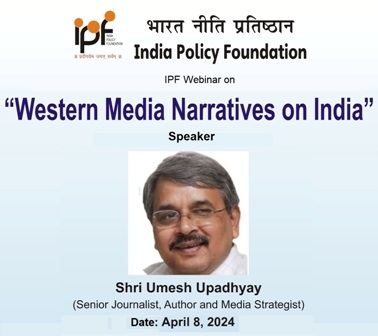
Speaker:
Shri Umesh Upadhayay
(Senior Journalist, Author and Media Strategist)
Moderator:
Dr Kuldeep Ratoo
(Director, India Policy Foundation)
Dr Kuldeep Ratnoo:
On behalf of India Policy Foundation, I welcome today’s speaker Shri Umesh Upadhayay, our chairperson Prof Sheila Rai and all the participants who are present here. The topic of today’s webinar is ‘Western Media Narratives on India.’
The reason why we have taken up this topic for discussion is because recently a book authored by Shri Umesh Upadhayay was published titled Western Media Narratives on India: From Gandhi to Modi. I felt this is a pertinent topic and we should have detailed discussions on this. First, I will give an introduction of Umesh ji after which he will deliver his address followed by a question-and-answer session.
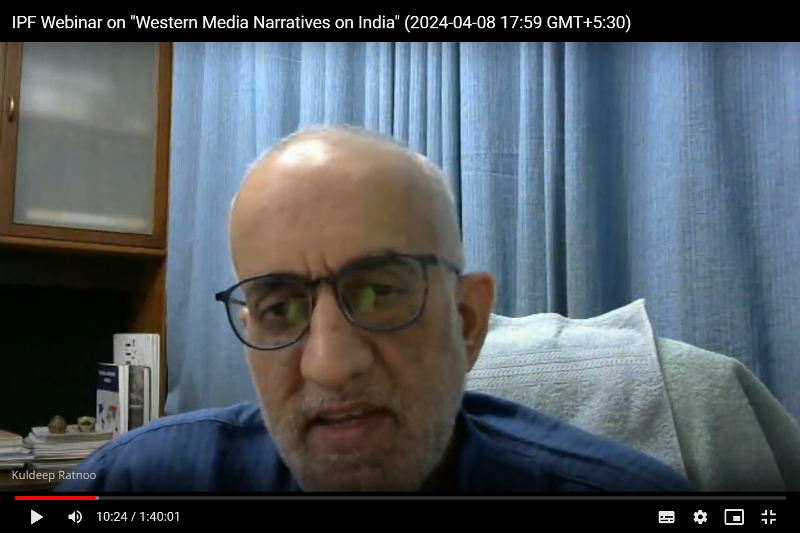
Shri Umesh Upadhyay is a veteran journalist, author and media executive. He is a big name in the media world and is considered among the best media strategists. He is the former President & Director of Media, Reliance Industries Limited, prior to which he was President of News at Network 18. His career spans over three decades during which he has been associated with Zee TV, Doordarshan, All India Radio, Press Trust of India, SAB TV, Janmat TV and many other prominent media platforms. He is a member of the Editors Guild of India.
He has held a senior position in the academic field as Director of the Disha Education Society in Raipur. He is a member of the Advisory Council of the National Institute of Mass Communication and Journalism, Ahmedabad and is in the Executive Council of the Indian Institute of Mass Communication, New Delhi. He is an alumnus of Jawaharlal Nehru University (JNU) where he did his Masters and M.Phil. at the School of International Studies, JNU.
He is a recipient of many awards including the Ganesh Shankar Vidyarthi Award for lifetime contributions in the field of Journalism and Media. He is a prolific speaker. His speeches are available on all the important social media platforms. It is an honour that Umesh ji has come to address us today.
The topic for today is extremely important because for the last several years whenever India is represented in the western media, especially after 2014, they either show the congested roads or the cows roaming in the streets or the unkempt surroundings or poverty. But when it comes to showing America or countries in Europe, the poverty in these countries get completely hidden and what is shown are the clean roads, skyscrapers, monuments and their art and architecture. Whenever India has been picturised in articles or videos, the perception has always been negative.
Following this, the same practices were seen to be adopted by journalists in the western media. For example, if a rape happens in Delhi, then they immediately term the city ‘the rape capital of the world.’ And when a crime gets committed in an Indian city, they quickly say that the crime rate in India is the highest in the world. Overall, they have ensured that India is portrayed in a negative way. Along with this, there are a few international organisations and NGOs, which when they come out with global hunger index and rankings for press freedom will put India lower than even those nations where there is no development. The rankings become difficult to believe. For example, when it comes to press freedom, they rank India lower than Pakistan and at par with Afghanistan. When it comes to hunger index, those nations where India send aid so that there are no hunger deaths are ranked higher. For the last several years, our country has had surplus food, good storage facilities and we have been exporting our grains. Still when the rankings come, the West places India at the 150th position.
Another new propaganda that has been started by the Western media is that there is no democracy in India. They even go on to state that the followers of Hindutva have formed a militia and there is a paramilitary force that has laid claim on the government and are killing all the democratic institutions. This propaganda is being constantly run by the western media. So, we are aware of all these issues.
We believe that Shri Umesh Upadhayayji with his many years of experience in the media industry and also having written a book on this topic will be able to enlighten us and guide us on this. It is a very important topic and I welcome all of you once again to the webinar. I request Umesh ji to share his views.
Umesh Upadhayay:
Namaskar! Thanks Kuldeep Ratnooji. I am happy to address the august audience.
The book that was mentioned, Western Media Narratives on India: From Gandhi to Modiis written in English because I thought that the war of narratives is basically fought in one field and that is, English. The Hindi version of it is also coming out soon.
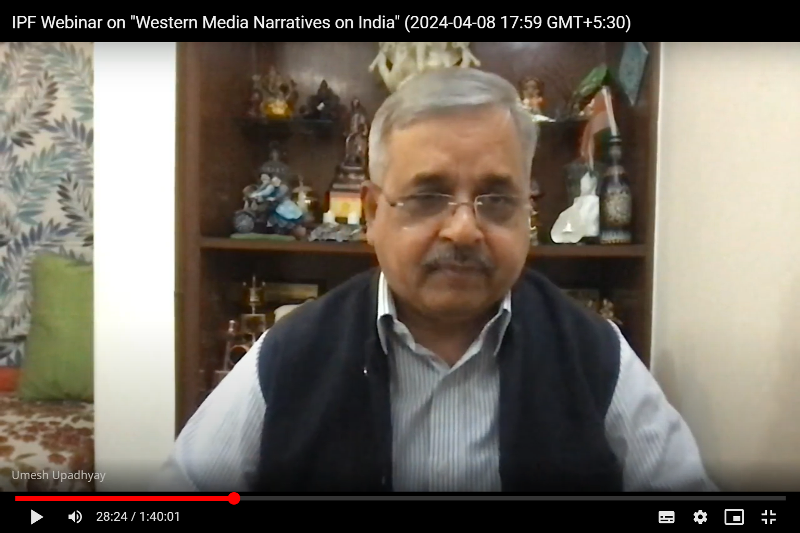
It is difficult to start a conversation around the book because for an author, every chapter is important. But if I have to describe my book and the subject it deals with in one sentence, then it fundamentally deals with ‘colonisation of minds.’ In colonisation of minds, how does the western dominant English media influence our minds? I have limited the scope to English media because that impacts our thinking the most. The historical reason is that we were ruled by the British. South Asia is highly influenced by the dominant Western media. So, my book has focussed on cultural imperialism, which is visible in a lot many forms in the present times.
As I said earlier, it is very difficult to determine from where to start my talk. I will do it with an incident that has been mentioned in my book. The incident is that of Hyderabad’s integration. It happened on 15 September 1948. The Nizam of Hyderabad had refused to sign the Instrument of Accession. Now, I will throw light on the role that Western media played just two days before the Instrument of Accession was signed. Two days before, a British newspaper reported that India was violating the standstill agreement and they portrayed Sardar Patel as a villain in this whole saga. It is interesting to note that when this news was published, a session of the House of Commons was underway in Britain. During that time, Anthony Eden was the leader of opposition. He showed this report to the members of the House of Commons and stated that India is violating the standstill agreement and there is a war-like situation in Hyderabad. If the British government wanted, it could have said that it is the internal matter of an independent country. Instead, the British government allowed the matter to be discussed at length. The British Secretary of State intervened in the matter and delivered a lengthy speech in which he said that if the situation continues, things will turn grave.
Yet another interesting fact is that during that time Britain was the chair of the United Nations Security Council (UNSC) which was supposed to meet in Paris within a day. So, Anthony Eden put forth the proposal of presenting this matter to UNSC. The British government using very clever tactics, secured the permission of the House to do so. This happened due to just one report that was published in a newspaper. This is an example of how one small write-up in a newspaper can be used for vested interests. We are well aware of how this happens in our parliament too. So, the technique is very old.
I just gave you an example of what happened in 1948. The matter did not end there. After this, the British newspapers constantly portrayed Sardar Patel as a villain and the Nizam was portrayed as an affected party, a victim. But if you read the Indian newspapers of that time, then you will come to know that it was the Nizam who did not follow the standstill agreement. For example, he had spoken to the rulers in Goa and asked them to give him a port which will give him the ease of travel. In the meantime, the Razakar leader, Qasim Razvi, had readied a militia which terrorised and killed the Hindu population of Hyderabad. But none of these incidents were ever reported by the British newspapers. Instead, a small write-up that was used in the House of Commons to malign the nation.
A question that is often asked is why should we bother about what is published by the British newspapers. There is no reason to worry about it as we have our own newspapers that are greatly independent. But it is interesting to note how did this affect the British public opinion. A commoner in London named Gordon Collier read all these articles and wrote a lengthy letter to Sardar Patel wherein he said that India is a democratic nation and the treatment meted out to the Nizam is unfair. In fact, he had addressed the letter saying that “this is a letter from nobody to somebody.” Sardar Patel replied to this letter in which he said that the British newspaper often misrepresent India. He added that such misrepresentation occurs due to ideological reasons as well as historical reasons and they spread evil propaganda against India. I have included this letter in my book.
Why I told this here is that whenever India is represented in such a way by the western media, it has long lasting consequences. This is because in western countries, the public opinion can influence policies. The narratives of the western media influence the World Bank, the World Health Organisation (WHO), the lending decisions of the International Monetary Fund (IMF) and also the decisions taken in the United Nations (UN).
There are many such examples which show that the western media has a biased agenda against India and other developing nations. The book has touched upon the reasons why the western media is agenda-driven. This is not something that started today or even from the time of Gandhi. There are historic reasons behind this. Media itself is a product of imperialism. Often times, we are unable to understand this and see media as a watchdog. But the media has never been an independent watchdog. It is a product of the system. It is a product of the imperialist enterprise. So, its job is to maintain the existing international power balance which is heavily loaded in favour of the western countries. Western media nurtures it, furthers it, cements it and creates stories, creates narratives that help this. Our People often feel that if an article is published in the New York Times, the Washington Post or the BBC, then it is the final truth. In cases where they don’t see something as the final truth, they still seek validation from these publications. They do not get affected by what is published in the Indian papers but take great pride if something is published in any of the major western publications.
Now you may feel that the arguments I made are just my observations and may not reflect facts. But my book is solely based on facts. The book has more than 300 citations from primary sources. The book also discusses the period when the whole enterprise of imperialism was set in motion, about 300-400 years ago. We need to understand how media is a product of imperialism. When the European countries went all over the world to establish their supremacy in the name of exploration, be it the expedition of Vasco de Gama, Columbus or Sir H.M. Stanley, in 90 per cent of the places, joint stock companies were established to lower the expenses. We know that East India Company was formed, Dutch East India company was formed and Latin American Company was formed among many others. The investment in these companies were that of the wealthy of those countries. Often, the royalty of the countries also had an investment in these companies. So, the companies’ investors were always curious to know about the state of the nations where the companies were established. So, the reporter followed the explorer. Many of the academics say that reporting is actually exploration in a way.
We are often taught that good news is no news and bad news is news. Where did this mindset come from? So, the investor had to take stock of the situation in that country and determine if there was a flood coming, or if the country was at war etc. And the investor was not solely dependent on the descriptions of the explorer. A reporter was sent along with him. It is because of this that the entire communication system that was developed in the world did so around the imperialist system. They had two important responsibilities – to know more about the military route and trade. The telegraphic system which was later developed was also along the same lines.
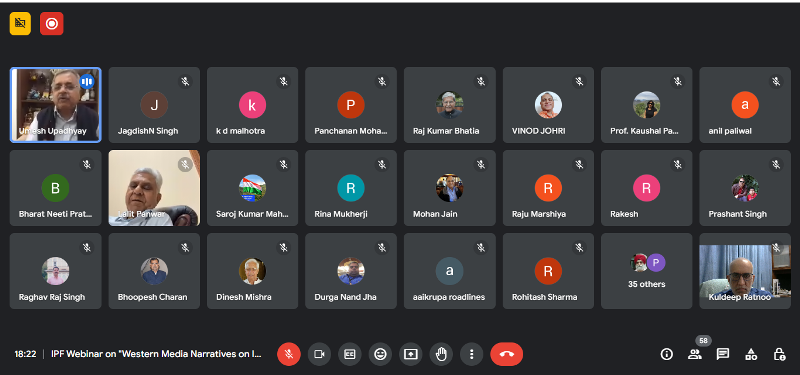
Today, there is a lot of user generated content. Despite that, people across the world are dependent on four major news agencies for news - Associated Press (AP), Agence France Presse (AF), Reuters and United Press International. All these four agencies were established during the period between 1840 to 1850. The first and the biggest agency that was formed was Reuters followed by AFP, Wolffs, AP etc. When these agencies were formed, they captured the entire information system of the world. Before 1860, these four major agencies had reached a quadrilateral agreement in which they divided the world into exclusive zones. It was decided that no other agency will go into these zones. Next, the division was done along imperialist lines. For example, Reuters which was established in Britain was given the entire responsibility to cover the British empire and they monopolised it. Because France had a major interest in Latin America, AFP was given the charge to cover Latin America. The French government had also contributed to this. AP got the whole of America. This quadrilateral agreement was in force till the first world war. Even after that till the present times, these agencies still function on the imperialist lines. So, when such monopolisation and categorisation happened which, we term it as ‘cartelisation of news’, then phrases like freedom of expression, press freedom etc. came to be used as a veil.
I have given an example of this in my book. After the first world war, all the nations were setting up their national agencies. India was not independent then because of which it couldn’t be a part of it. The Press Trust of India (PTI) was formed in 1947. When PTI was formed, Reuters arrived at an agreement with it, according to which the area between Cairo to Singapore was given to PTI for coverage. PTI became a shareholder of Reuters. PTI also established a desk in London. Something very interesting happened here. When it came to taking a worldview, the Indian media did not share the same perspective as that of Reuters in other matters of the world. During that time, Reuters was supporting the anti-communist movement. But India shared a different view and wanted to see beyond the iron wall. So, a rift became evident between the two agencies in the name of coverage. I am talking about people who have been advocating for freedom of speech. In this regard, an interesting word was mentioned in the letters of Jawaharlal Nehru.
As said earlier, PTI could exclusively cover news from Singapore to Cairo. But after a few days, Reuters felt that the Indian reporters were writing news from an Indian perspective. So, they appointed a foreigner inside Pakistan. This was a violation of the agreement. It came to light that Gandhiji’s statue was broken in Karachi by a few miscreants. But the foreign correspondent stationed in Pakistan reported that ‘A Gandhi statue was broken in a gale.” When the London desk received this story, the PTI correspondents cross checked the facts with their source in Karachi and got to know that it is not right reporting. They changed the copy and wrote that the statue was broken by miscreants. Reuters did not like the independence shown by PTI and there were a lot of difference of opinion. PTI wrote a letter to prime minister Jawaharlal Nehru and asked Nehru to intervene in this matter. Nehru had to intervene in this, not because he was the prime minister but he was also the foreign minister, and it was his duty to see that the Indian interests are not marginalised. In this letter, he said that even though Reuters says that it is independent, he is not aware if there is any agency that is independent and it says in so many words thatReuters represents British interests. This letter has been included in the book. Through these incidents, I have made it clear how a reporter is born out of imperialism, how the ways of reporting are born from imperialism, how the whole world is divided on the basis of imperialist interests and how the business is being cartelised.
Now we can say that this is the era of social media and anyone can say or do anything. I have touched upon this topic. It is true that every person can now become a reporter and everyone has the freedom to do so. But the reality is that the cartelisation of news has been more solidified. In the history of humankind, there has never been a time when such a huge monopolisation has taken place in the storage and dissemination of news. A few technology companies based in America control the entire dissemination system. Their algorithms and storage systems are so powerful that they decide what will come on yours and my timeline and in which priority will they come. Furthermore, whether we can even see some content or not, are all decided by these companies.
When the farmers protests happened and when a few miscreants stormed the Red Fort and hurt the dignity of India, the Indian government had requested that those visuals should not be there in the public domain. But in the name of freedom of expression, these tech companies refused to withhold the images. However, when a similar incident occurred in Capitol Hill, these companies immediately blocked the pictures from being published. We need to ponder over the extent of monopolisation that has taken place in today’s world.
Before concluding, I would like to mention a few more incidents that have been included in the book. You may remember that the New York Times had published a story on 25 May 2021 in which it said that around 4.2 million people had died in India due to Covid-19. It created four scenarios to argue that the data from India cannot be believed and that 4.2 million people have died due to Covid-19. This news was also picked by a lot of Indian newspapers and they printed it as it is. It is interesting to note that during that time, the actual statistics in India of people who died due to Covid-19 was 3,07,000. How the western media arrived at a figure of 4.2 million deaths is still unknown.
When we researched on this, we could find that all over the world, the people affected by Covid-19 was 69 crore till 2022. Within a year of the pandemic, the western media put a figure that was not even close to the world average. There was no basis for the number that was arrived at. My point is that during the first wave of Covid, there were a lot of deaths in Europe whereas in countries like India, the death rate was really low. So, the European media did not like that a country they used to term as illiterate, undeveloped, ungovernable etc. had low death rates. That is why they kept raising suspicions on the figures released by the Indian government. So, they built a web of lies which later went on to become a narrative that became etched in the minds of the people. Even the Indian media had printed this news.
When I went further into this topic, I saw the data of the New York Times Covid tracker in December 2023. In it, they said that almost 5.5 lakh people were killed in India due to the virus. After this, they stopped tracking India. My question is very clear. If the earlier statistics were wrong, then should the New York Times not apologise to the people of India and its government? Should it not have accepted that there was a serious miscalculation and misrepresentation from its side? We know that this will be a little too much to expect from those sitting on a high pedestal.
There are a lot of other examples. What did BBC do to Indira Gandhiji and Atalji? What did they do when we successfully launched Chadrayaan and Mangalyaan? What did Reuters write when we won medals at the Asian games? There are many such incidents mentioned in the book. And it is not just with us, they have also done something very similar with Suriname. All these have been written about in detail in the book.
One last point I want to make is that whenever there is an assertive leadership in India and if a leader speaks about the country, then he/she becomes the target of the western media. A very racist mindset works in this case. I am using the word ‘racism’ with a lot of thought and understanding. The racist mindset is a Churchillian mindset. A leader like Churchill used to think that India is ungovernable, cannot be administered. In 1930, he has delivered a speech titled ‘Our Duties in India’, in which he stated very clearly that if British officers are removed from India, then the country will get shattered in pieces.
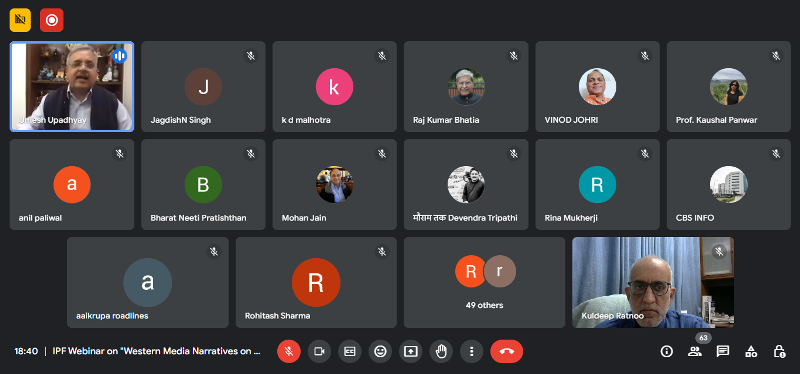
So, this perspective is not individual-centric, it is fundamentally anti-India. Today, Narendra Modi as a strong and independent leader represents India. He can look the West in the eye and say that the war in Ukraine is theirs and India will buy oil from a country that it feels is the best option. He can say that it is in the national interests. Because the West cannot openly confront India, it uses its media to say that India should stand with Ukraine and the country should not forget where it stood a few decades ago. For them, all that matters is who listens to them and who does not. My guess is that after the elections, the West will ramp up its attack against India. After terming the government as a nationalist government of the Hindu nationalist party, they will go to any lengths to strengthen this narrative. They had called Atal Bihari Vajpayee ji also a Hindu nationalist leader. Now you can see how any leader who talks about India becomes their target. My whole book is on this. I urge everyone to read the book to know more on this topic. Thank you!
Dr Kuldeep Ratnoo:
Thank you so much Umeshji! You spoke about the topic in detail. You gave a lot of good examples – what happened in Hyderabad as soon as India got its independence, how the western media distorted it, how the British rulers made it an international issue and portrayed Sardar Patel as a villain to the current example of farmer protests and how the Indian flag was insulted and about the prejudiced propaganda of the west. You also said that this is not person centred. Whenever something suits the western agenda, they show some sympathy. But when something does not suit their agenda and when they feel that if a leader is being assertive,be it Indira Gandhi, Vajpayee, Chandrasekhar or Narendra Modi, then they have a problem.
I have a question. They do have certain choices when it comes to individuals. For example, when Arvind Kejriwal was arrested in the liquor policy case, the western media had made a hue and cry about it. It seemed like Arvind Kejriwal was a big political leader in the country. But the truth is that he is the chief minister of Delhi which does not even have full statehood and the chief minister of Delhi has only limited powers. Yet the United Nations lodged a strong protest when he was arrested and this whole conversation began due to the reportage of the western media. During the same time, another chief minister of the Indian state of Jharkhand was also arrested on corruption charges and nobody raised an issue there. No international leader spoke on the topic. All the coverage was meant exclusively for Kejriwal. I do believe that somewhere they have their preferences, favourites and choices. They are concerned about those leaders, ideologies and parties as well as academicians and activists who serve their narrative well. This difference has nothing to do with assertiveness, it is about protecting the people who were carrying out “their work” and enabling these people to implement the agenda of the West with ease. Can you please share your thoughts on whether the West has any favourites?
Umesh Upadhayay:
The West’s interests in individuals are only till the time the strategic interests align. The West will do anything to protect that person. But when that person stops serving their interests, then they no longer bother about that person. I have not written about Arvind Kejriwal’s issue in my book because of which I am not aware of the intricate details. But I can say one thing. At one point, Saddam Hussein was the cynosure of the eyes of the West but they lost no time in turning him into a villain. So, whomsoever suits their long-term civilisation interests becomes their favourite. However, it is not person centric as they have nothing to do with that person. They are only concerned about their interests and at a particular point in time, they will do all they can to protect a person. They will only act according to their interests.
Q&A session:
Leena Gahane: When biased information is being published in the world media, what should be the role of national media in countering this?
Umesh Upadhayay: Media has its own DNA. If we look at the Indian media, it can be divided into two – one is the English media and the other is the regional media. We can see a lot of difference in these two as evidenced at the time of Gujrat. The common media in India has the nation’s best interests at its core. But the colonisation of enterprise is embedded in our minds. When I spoke about the western media, not everywriter is a westerner with an American or British passport, you will see a lot of Indian names there. They want to prove that they are more loyal to the West. They want to portray that they are “objective”. The Indian media should ensure that whatever the five or six publications of the West print or publish should not be considered the gospel truth. Unfortunately, all these publications are kept in Indian libraries as reference material and are also often quoted. A lot of times, this also affects our policy framework as there are changes made in the policies. It is an issue of mindset and colonisation of minds. Media is a part of this and we need to keep this in mind.
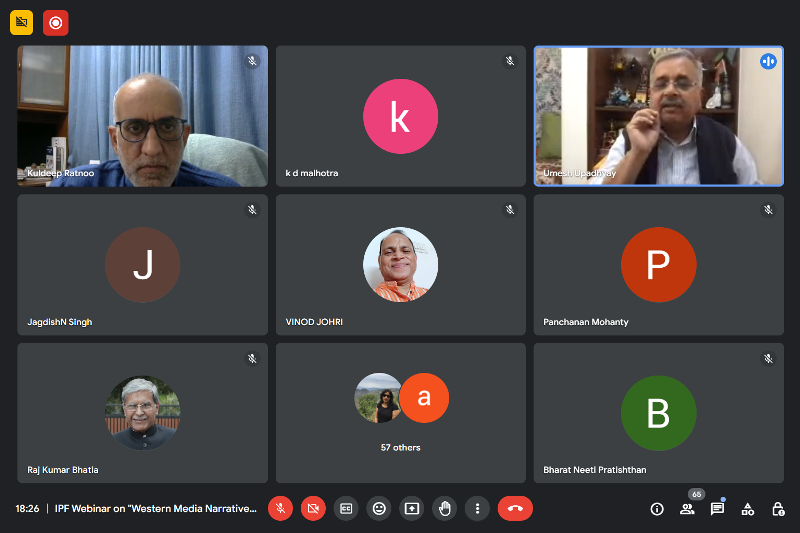
Dr Rajan Gupta: You spoke about imperialism. Can we also not start a parallel structured imperialism in those countries. The problem is there in many fields. For example, Ayurveda has originated from our nation, yet we need to follow the parameters set by the West.
Umesh Upadhayay: First, imperialism is not something that we should replicate. It has never been part of India’s thought. We have never conquered another country. We are thought leaders and we constantly engage in dialogue. And as you rightly said, the problem is there not just in media but everywhere. The only difference is that it is more visible in media. We need to understand the ecosystem surrounding this. Media is a small part of this ecosystem. The ecosystem has NGOs, educational institutions, films, music etc. Media only shows the narratives that all these platforms weave. Our Lata Mangeshkar was a very good singer but people kept saying that greatness can be achieved only if one wins the Emmy or Oscars. These signs of imperialism are etched in our minds and we need to erase them. The western media has been playing this game with us for at least 300-400 years and it has become even more pronounced now.
Hitesh Singh: When the Capitol Hill incident happened, the US used laws that have never before been used to keep Trump out of power. But the Indian media did not use it to argue that democracy is under threat in the US. Why were they not able to use an issue that was there in the public domain? If Russia wins the Ukraine war after the West spread a narrative that a dictator like Putin will never be able to win the war, what will be the long-term consequences of it for the western media?
Umesh Upadhayay: When the norms of a deep state are disturbed, then they refuse to accept the leaders, be it Trump or anyone else. An example of this is how the stories about Hunter Biden were blacked out by social media just before the elections. After the elections were over, the media apologised for not reporting the story. If they had, it would have changed the results. When it comes to the Russia-Ukraine war, it is clear that the western objectives are not getting fulfilled. Now the West is silent on Ukraine and has shifted the narrative to Gaza. They use diversionary tactics to completely bury an issue. I agree with you that they have painted an entirely different picture of Putin than what is the reality.
Keshav Kumar: In the era of globalisation, what role can the traditional Indian media play?
Umesh Upadhayay: I did mention in my talk that even after the advent of social media, things have not changed drastically. In fact, today because of increased digital penetration, social media companies have the power to further the western agenda. We do not know how social media is influencing the 15 and 16-year-olds. The situation has turned grave. It would have been better if we had created alternate platforms, like how we have our regional media. We should have created something similar in the social or digital media space too. But we have missed that bus.
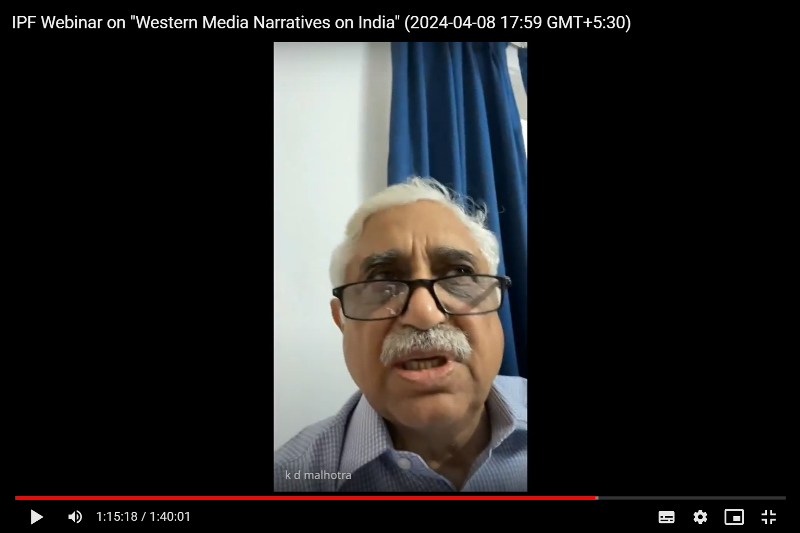
Brig K.D. Malhotra (Retd.): If there are three generations in the house, then the elder generation gets their news from newspaper and the younger generations get it from television or social media. But we all remain informed. When we used to study China in 1977-78, we used to view the country from a different lens because they were economically backward. Then we saw that China had banned companies like Google and Facebook and got to know that China has the highest number of people on social media, more than any other country in the world. We are also getting to hear that China has been influencing the US, Indian and South Korean elections. China understood the agenda of western media early on and started negating them. But we did not do anything to put a strategy in place like China. I got to know that about 30-40 students in China who are doing their Ph.D. in lesser known Indian languages. This means that they have a long-term strategy in place. India needs more channels to compete with the West. India should stop being defensive and understand the power of the media.
Umesh Upadhayay: We cannot compare ourselves to China. It is a totalitarian and authoritative society and cannot be replicated. Yes, we could have created big social media organisations but we did not. Coming to your second point on how India can be part of this narrative, it needs to be noted that a democratic nation has its principles as well as limitations. We did not have the economic prowess to build such a huge media network. BBC in the last few years has made huge investments in regional languages. Their Marathi desk employs close to 40 people. We need to concentrate on those areas. Next, this is not the job of the government. Civil society bodies and trade bodies have to come together to work in this field. But we have a preconceived notion that corporate media is not balanced. Alternate media needs investment and resources, which cannot be done by a democratic government. When it comes to social media, there is a need of a new world information order and India has the wherewithal to take lead in this. India has the technological power, investment avenues, democratic society and independent judiciary. China will never be able to do this because there will be no trust in that nation. The time has come to openly think about how such big organisations can be created in India.
Leena Gahane: When Article 370 was abrogated, how did the world media react?
Umesh Upadhayay: During that time, it did not suit the world media to upset India. They reported the news but did not run a big campaign around it. Their interests were aligned at that point, so they did not turn it into a big issue. They wanted to get out of Afghanistan and it suited their long-term strategic interests. However, they have kept the issue alive to use it in the future. Two months ago, the US Ambassador stayed at Pakistan Occupied Kashmir. They did this to attack India in the future.
Lekshmi Parameswaran: It was brought to light by the former CEA that IMF has been consistently inaccurate about India’s growth. In light of this, are there any recurring themes in the portrayal of economic growth by the western media?
Umesh Upadhayay: Their rating agencies have consistently rated us poorly. What are their criteria of rating us? Why are sovereign ratings not been upgraded? That is a game that they play. Now I think because they want to economically counter Chinain any manner, it suits them to say that India is growing. Our job is to take advantage of this window of opportunity. China had used the opportunity to the fullest when its interests and the US interests were aligned. I am sure our leadership is capable of doing that and they are doing a very good job.
Dharmendra Dubey: Does the New Education Policy have any impact on the syllabus of the higher education institutes dealing with media?
Umesh Upadhayay: The syllabus and academic institutions play a very important role in narrative building and media studies form an important component of it.
Sanjiv Kumar Pandey: Do Indian news agencies spread their agenda in foreign nations, like howthe western media spreads their agenda in India?
Umesh Upadhayay: Indian media does not do anything of that sort. I can give an example to prove my point. When China wanted to increase its influence, there were more than 25 staff of CCTV in Sri Lanka. The combined staff strength of India’s PTI, UNI, ToI, Prasar Bharati and all the other media outlets all over the world will not be more than 30. We are still not proactive in this matter, even though it is important to increase the Indian media’s influence.
Mr Nair: How come the media got controlled by the left leaning people worldwide?
Umesh Upadhayay: It is the ecosystem that is coming out of the universities that generates and creates such kind of people.
Pradyuman Dutta: Is there a suggested diplomatic course of action that could be taken to foil such conspiracies? What part can the literary community in India can play.
Umesh Upadhayay: There are two factories of narration building in the world, one is New York and the other is London. We need to have our strong presence there in terms of NGOs and other activities. In these two places, we should create structures to fight this battle.
Raghav Raj Singh: My concern is with regard to bold government policy and strategic planning to deal fearlessly with such narratives. Why should a democratic state please the peripherals?
Umesh Upadhayay: I agree with you but India has to do it. Indian government should make an atmosphere so that our private enterprise and the civil society creates such structures. America’s deep state supports the New York Times. India has to create those kinds of structures.
Dr Mohan Jain: What should be our strategy to counter this? Can we challenge them in the International Court of Justice?
Umesh Upadhayay: I don’t think so. It is a narrative war. The irony is that India is the original storytellers of the world but our story is being told to us by someone else for the last 200-300 years. It is incumbent upon us to tell our story to the world.
Hemant Tak: Artificial Intelligence can easily create narratives and can spread to target audience quickly. How do we manage this virtual and imaginary world of systematic social biases creation?
Umesh Upadhayay: We have people at the right places. If we can network that, we can do it.
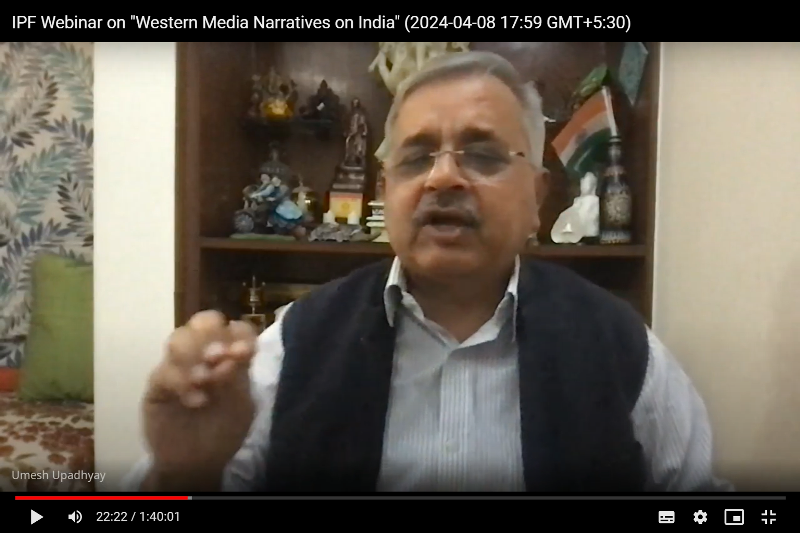
Dr Mohan Jain: Is there any international forum for the media organisations where this issue can be raised? What role can NRIs play?
Umesh Upadhayay: NRIs can play a very important role and they are already playing a very important role. They have won many battles for us in many places, including some universities. In New York, Washington and London, we need to have structure where we can help these efforts. As far as the other forums are concerned, they are all represented by the West. We have to raise our voice there but they are very tightly controlled by these interests.
Ashish Anshu: In many countries, Prasar Bharti is partnering with reporters there to get the news. So, in a way, they are spreading our narrative.
Umesh Upadhayay: I do not think Prasar Bharti is capable of doing this alone. They cannot fight this battle by themselves.
Dr Kuldeep Ratnoo
I thank everyone for their participation. A lot of good questions were asked by you. The core issue is of colonial hangover. We have a mindset that whatever the westerns say and think is right. The biggest influence of this can be seen in the Indian media, academia, political class and bureaucracy.
Till the time, we blindly follow the western narrative and refuse to accept our truth, the problem will keep getting exacerbated. There are people who are awakened and know that the West runs a propaganda and it never reports the truth. Apart from this, we have a huge section in the media that is so influenced by the West that they blow up anything that comes from the West. There are also people with similar line of thinking in academia and bureaucracy.
It is important that we understand the narrative by foreign media. We should not think that whatever the West says is written in stone and spread their narrative. We saw it during Covid-19, how the foreign sources were quoted to attack our nation. We also have this thought that whatever comes from them is better than what we have. If our media reports 10,000 deaths and the foreign media reports 40,000 deaths, it is our tendency to believe the latter. Often times, it is argued that what they say has more logic. So, this mindset is the biggest problem. Once we rid ourselves of this mindset, then we can confront them with our ideas.
The second issue that I feel is that even now we are big introverts. India has always taken pride in the fact that we have never had an expansionist outlook and has never conquered or supressed anybody. Sometimes, this becomes our weakness. We hesitate to put our ideas forward and instead accept what others say. Even in rural areas, the mindset is still prevalent that if a news is aired on BBC, it must be the truth, irrespective of what the regional media or Prasar Bharti reports. This is because they have been listening to this since their childhood. There is a whole generation before independence that believes that the news from BBC London is accurate. This thought process continues to this day.
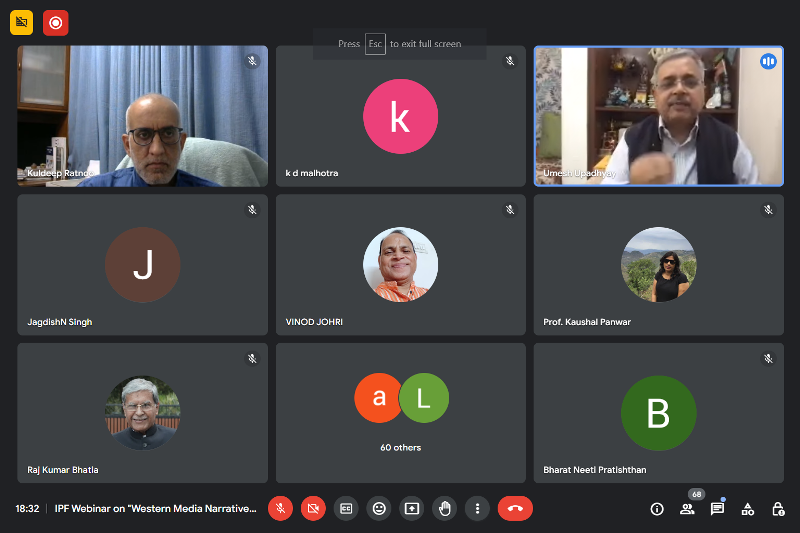
These two factors – believing the western propaganda and not speaking our mind remain the biggest weaknesses. Till we overcomethis weakness, no investments will come and we will not have our spokespersons anywhere in the world nor we willhave our own digital platforms. It is true that China has developed the alternatives of Google, X and Facebook. But we couldn’t do anything. Even today, we are dependent on operating systems like Microsoft and we have developed nothing of our own. We are such a big nation and we want to spread our knowledge to the world but we have been unable to focus on our fundamentals where we have our indigenous media platforms. Till the time this weakness remains, the West’s propaganda will come heavy on us. Due to the increased awareness through social media and other channels, there are some people who are countering the western narrative. Once this awareness increases, we will find ourselves in a better position.
Once again, I thank all of you. Most importantly I thank Umesh Upadhayayji for giving us his valuable time and guiding us. On behalf of Bharat Neeti Pratishthan, I am grateful to you for the time that you have spent in attending this webinar. I thank everyone for their active participation today.

